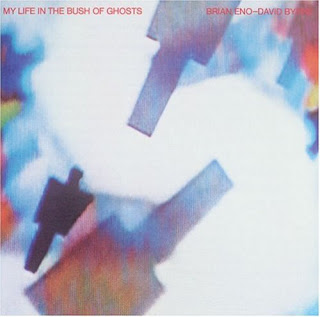David Byrne & Brian Eno
My Life In The Bush Of Ghosts
1981
Experimental Art Rock
Scotland / England
Tracklist:
Side one
"America Is Waiting"
"Mea Culpa"
"Regiment"
"Help Me Somebody"
"The Jezebel Spirit"
Side two
"Qu'ran"
"Moonlight in Glory"
"The Carrier"
"A Secret Life"
"Come with Us"
"Mountain of Needles"
My Life in the Bush of Ghosts is a 1981 album by Brian Eno and David Byrne, titled after Amos Tutuola's 1954 novel of the same name. The album was re-released in expanded form in 2006.
Receiving strong reviews upon its release, My Life is now regarded as a high point in the discographies of Eno and Byrne. In a 1985 interview, singer Kate Bush remarked that the album "left a very big mark on popular music," while critic John Bush describes it as a "pioneering work for countless styles connected to electronics, ambience, and Third World music." The extensive use of sampling on My Life is widely considered ground-breaking—it was one of the first albums to do so—but its actual influence on the sample-based music genres that later emerged continues to be debated.
The album was recorded entirely with analogue technology, before the advent of digital sequencing and MIDI. The sampled voices were synchronized with the instrumental tracks via trial and error, a practice that was often frustrating, but which also produced several happy accidents.
Also according to Byrne's 2006 notes, neither he nor Eno had read Tutuola's novel before the album was recorded. Both were familiar with Tutuola's earlier The Palm-Wine Drinkard (1952), but his My Life in the Bush of Ghosts was not easily obtained in the U.S. when the material was recorded. Even without reading the book, Eno and Byrne thought the title reflected their interest in African music, and also had an evocative, vaguely sinister quality that also referenced the voices sampled for the album: the vocalists were recorded sometimes several decades before being re-appropriated by Eno and Byrne, and the voices often seemed to take on unanticipated qualities when placed in the new context.
Personnel
David Byrne and Brian Eno – guitars, bass guitars, synthesizers, drums, percussion, found objects
John Cooksey – drums on "Help Me Somebody" and "Qu'ran"
Chris Frantz – drums on "Regiment"
Busta Jones – bass guitar on "Regiment"
Dennis Keeley – bodhran on "Mea Culpa"
Bill Laswell – bass guitar on "America Is Waiting"
Mingo Lewis – bata, sticks on "The Jezebel Spirit" and "The Carrier"
Prairie Prince – can, bass drum on "The Jezebel Spirit" and "The Carrier"
Jose Rossy – congas, agong-gong on "Moonlight in Glory"
Steve Scales – congas, metals on "Help Me Somebody"
David van Tieghem – drums, percussion on "America Is Waiting" and "Regiment"
Tim Wright – click bass on "America Is Waiting"
Rooks on "Help Me Somebody" courtesy of April Potts, recorded at Eglingham Hall











